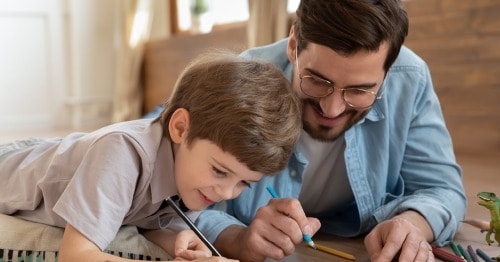Fun Activities for Celebrating 100 Days of School
by Kristina Cappetta
byCorissa Hennessey
5 min to read“Toughen up.”
“You’re being lazy.”
“You’re weak.”
Mental health stigmas like these, which are commonly associated with the fear of rejection, can unfortunately create barriers for children who want to have important mental health conversations. But what if we told you that, as a parent, having mental health conversation with your child has the potential to make or break their long-term success and happiness?
May is National Mental Health Awareness Month, and there’s no better time to bring awareness to the importance of having open, mental health dialogues in the home. Read on to discover pointers for having these difficult—yet necessary—conversations with your children.
Having open conversations about mental health—including about harmful stigmas and beliefs—is part of a healthy and connected family environment, even if your child isn’t showing any immediate signs of mental health problems. However, there are some indicators that may suggest it’s a particularly crucial time to have an intentional conversation with them about mental health.
School and social pressures, especially without proper social support, can lead to mental health problems for children. To top it off, recent events, including the pandemic, have left many young people with mental health challenges—data from the CDC revealed that in 2021, 42% of teens reported feelings of sadness and hopelessness, up from 37% in 2019.
For younger children, the impact may be even greater. Pre-pandemic anxiety and depression rates among children were between 8% and 12%, while post-pandemic rates were indicated to be between 20% and 25%.
Here’s a short list of signs your child may be struggling with on their own (or trying to cope with someone else’s) mental health challenges:
It’s important to be aware of any recent mood or behavioral changes, especially if they have lasted longer than a couple of weeks, as they could be indicators of a bigger mental health concern.

Whether you’re a parent, Learning Coach, or both, being able to openly discuss mental health will strengthen your relationship with your child, build trust, and ensure they never feel like they don’t have someone to talk to when they need it most.
Having a mental health conversation can be anxiety-inducing for parents who aren’t sure how to start the conversation, or who worry they’ll say the wrong thing. Rest assured that any effort toward an open dialogue is a step in the right direction, and the following tips can help you start off on the right foot:
A key part of any important conversation is to choose a good time. If your child is busy with school, playing a game, or rushing to get to softball practice on time, it may not be a good time.
If you are looking for the best time, try to aim for a moment when your child is calm and relaxed—if they’re angry or upset, they’re a lot less likely to be receptive. Consider bringing up tough topics during one-on-one time together, such as while going out for ice cream or another positive activity they enjoy, so that they’re free of distractions and you have an opportunity to connect face-to-face.
You can initiate the conversation in any way that feels appropriate for your child’s age and relevant to their needs. One way is to begin the dialogue with a gentle question. Ask them how they’re feeling. Do a lot more listening than talking while they tell their story. Listen with compassion and empathy and be sure to let them know that it’s not wrong for them to feel how they feel.
Avoid reacting to what they share with you. If you show anger over what they share or try to immediately give advice, they’ll be less inclined to share again with you in the future. Remain calm and remember you can work through it together.
According to Dr. Ariana Hoet, validating their experiences step helps to normalize both the conversation and what they’re feeling. Mental health challenges are not uncommon, and most people will have some aspect of their mental health effected at some point in their lives. If your child is struggling, let them know they’re not alone and that the feelings and emotions we have tend to come and go. Knowing they’re not alone in what they’re going through and that it’s not going to be forever can help put their mind at ease.
Ask directly if there’s anything you can do to help. This is a great opportunity for your child to open up and let you know what might be causing them feelings of distress, and what kind of changes they believe would make things better. Most importantly, let them know you’re there to support them and that you’re on their team.
Also, keep in mind that you may need to seek professional family support, especially if you or your child are showing signs of being overwhelmed, severe stress, aggression, or possible trauma.

Incorporate mental health activities for kids that are known for having a positive impact on mood: spend time together outdoors, add some of their favorite activities to the calendar, work together to come up with a balanced meal plan, and incorporate a mindfulness app for kids into their daily routine.
Normalizing comes with repetition. Keep the conversation ongoing by agreeing to touch base each week about their thoughts and feelings. If they have a difficult time identifying their emotions, consider using an emotion chart along with activities to improve mental health.
These conversations can be challenging for both parents and their children, but the courage to begin can make all the difference.
If your child is having thoughts or plans of suicide, contact the National Suicide Prevention Lifeline at 1-800-273-8255 for guidance.
by Kristina Cappetta
by Kristina Cappetta
by Kristina Cappetta
